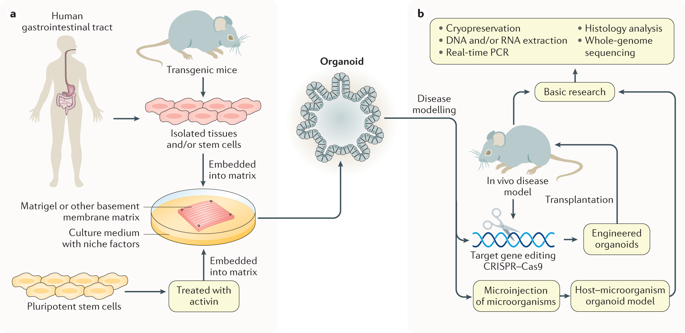当前位置:
X-MOL 学术
›
Nat. Rev. Gastroenterol. Hepatol.
›
论文详情
Our official English website, www.x-mol.net, welcomes your
feedback! (Note: you will need to create a separate account there.)
Organoid models of gastrointestinal cancers in basic and translational research.
Nature Reviews Gastroenterology & Hepatology ( IF 45.9 ) Pub Date : 2020-02-25 , DOI: 10.1038/s41575-019-0255-2 Harry Cheuk Hay Lau 1 , Onno Kranenburg 2 , Haipeng Xiao 3 , Jun Yu 1
Nature Reviews Gastroenterology & Hepatology ( IF 45.9 ) Pub Date : 2020-02-25 , DOI: 10.1038/s41575-019-0255-2 Harry Cheuk Hay Lau 1 , Onno Kranenburg 2 , Haipeng Xiao 3 , Jun Yu 1
Affiliation

|
Cancer is a major public health problem worldwide. Gastrointestinal cancers account for approximately one-third of the total global cancer incidence and mortality. Historically, the mechanisms of tumour initiation and progression in the gastrointestinal tract have been studied using cancer cell lines in vitro and animal models. Traditional cell culture methods are associated with a strong selection of aberrant genomic variants that no longer reflect the original tumours in terms of their (metastatic) behaviour or response to therapy. Organoid technology has emerged as a powerful alternative method for culturing gastrointestinal tumours and the corresponding normal tissues in a manner that preserves their genetic, phenotypic and behavioural traits. Importantly, accumulating evidence suggests that organoid cultures have great value in predicting the outcome of therapy in individual patients. Herein, we review the current literature on organoid models of the most common gastrointestinal cancers, including colorectal cancer, gastric cancer, oesophageal cancer, liver cancer and pancreatic cancer, and their value in modelling tumour initiation, metastatic progression and therapy response. We also explore the limitations of current organoid models and discuss how they could be improved to maximally benefit basic and translational research in the future, especially in the fields of drug discovery and personalized medicine.
中文翻译:

基础和转化研究中胃肠癌的类器官模型。
癌症是世界范围内的主要公共卫生问题。胃肠道癌症约占全球癌症总发病率和死亡率的三分之一。从历史上看,已经在体外和动物模型中使用癌细胞系研究了胃肠道中肿瘤起始和进展的机制。传统的细胞培养方法与大量异常基因组变体相关,这些变体不再反映原始肿瘤的(转移)行为或对治疗的反应。类器官技术已成为一种强大的替代方法,用于以保留其遗传、表型和行为特征的方式培养胃肠道肿瘤和相应的正常组织。重要的,越来越多的证据表明,类器官培养物在预测个体患者的治疗结果方面具有重要价值。在此,我们回顾了目前关于最常见胃肠道癌症(包括结直肠癌、胃癌、食道癌、肝癌和胰腺癌)的类器官模型的文献,以及它们在肿瘤起始、转移进展和治疗反应建模中的价值。我们还探讨了当前类器官模型的局限性,并讨论了如何改进它们以最大限度地造福于未来的基础和转化研究,特别是在药物发现和个性化医疗领域。食管癌、肝癌和胰腺癌,以及它们在肿瘤起始、转移进展和治疗反应建模中的价值。我们还探讨了当前类器官模型的局限性,并讨论了如何改进它们以最大限度地造福于未来的基础和转化研究,特别是在药物发现和个性化医疗领域。食管癌、肝癌和胰腺癌,以及它们在肿瘤起始、转移进展和治疗反应建模中的价值。我们还探讨了当前类器官模型的局限性,并讨论了如何改进它们以最大限度地造福于未来的基础和转化研究,特别是在药物发现和个性化医疗领域。
更新日期:2020-02-25
中文翻译:

基础和转化研究中胃肠癌的类器官模型。
癌症是世界范围内的主要公共卫生问题。胃肠道癌症约占全球癌症总发病率和死亡率的三分之一。从历史上看,已经在体外和动物模型中使用癌细胞系研究了胃肠道中肿瘤起始和进展的机制。传统的细胞培养方法与大量异常基因组变体相关,这些变体不再反映原始肿瘤的(转移)行为或对治疗的反应。类器官技术已成为一种强大的替代方法,用于以保留其遗传、表型和行为特征的方式培养胃肠道肿瘤和相应的正常组织。重要的,越来越多的证据表明,类器官培养物在预测个体患者的治疗结果方面具有重要价值。在此,我们回顾了目前关于最常见胃肠道癌症(包括结直肠癌、胃癌、食道癌、肝癌和胰腺癌)的类器官模型的文献,以及它们在肿瘤起始、转移进展和治疗反应建模中的价值。我们还探讨了当前类器官模型的局限性,并讨论了如何改进它们以最大限度地造福于未来的基础和转化研究,特别是在药物发现和个性化医疗领域。食管癌、肝癌和胰腺癌,以及它们在肿瘤起始、转移进展和治疗反应建模中的价值。我们还探讨了当前类器官模型的局限性,并讨论了如何改进它们以最大限度地造福于未来的基础和转化研究,特别是在药物发现和个性化医疗领域。食管癌、肝癌和胰腺癌,以及它们在肿瘤起始、转移进展和治疗反应建模中的价值。我们还探讨了当前类器官模型的局限性,并讨论了如何改进它们以最大限度地造福于未来的基础和转化研究,特别是在药物发现和个性化医疗领域。











































 京公网安备 11010802027423号
京公网安备 11010802027423号